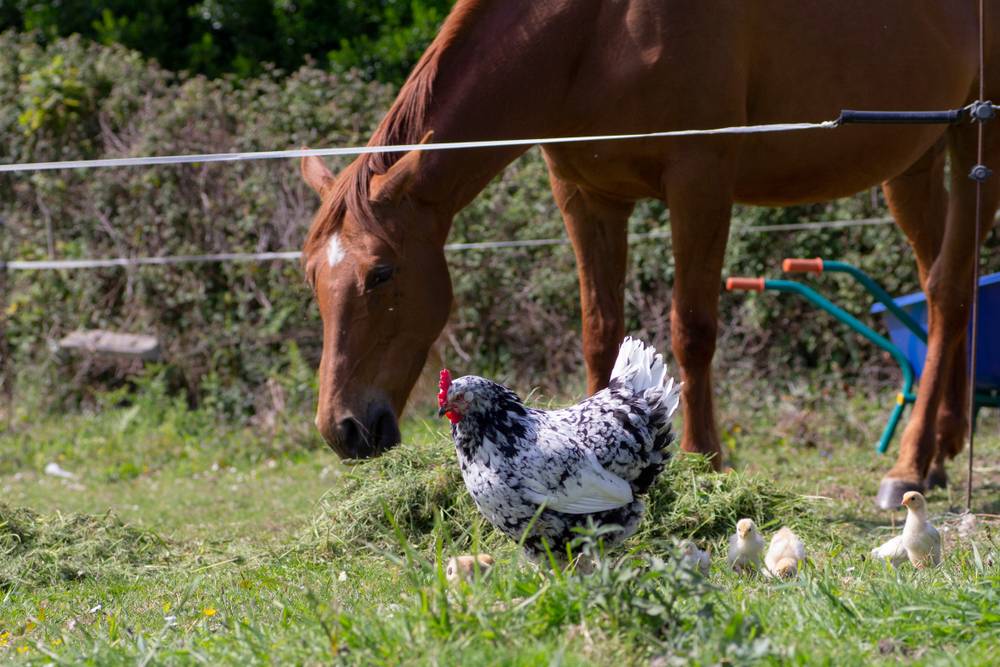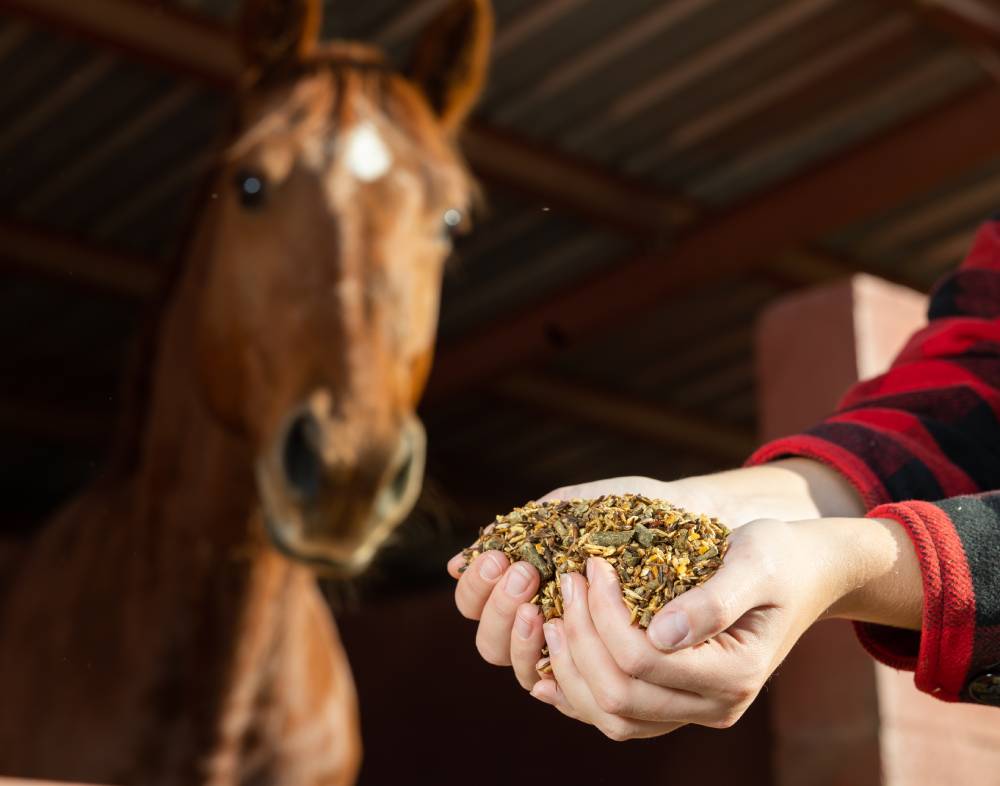
Inquisitiveness often arises when it comes to the dietary habits of a horse. One common question that frequently comes to mind is whether horses can safely consume chicken feed. While this might seem like an unusual inquiry, let’s thoroughly examine the potential consequences of introducing chicken feed into a horse’s diet.
So, Can Horses Eat Chicken Feed?
Horses should NOT consume chicken feed as it may bring severe problems to the digestive system and heart. Food for chickens contains elevated protein levels and distinct nutritional elements that do not align with the dietary requirements of horses. Signs of poisoning in horses may encompass colic, diarrhea, and lethargy.
Understanding Equine Dietary Needs
Horses in their natural habitat have evolved as grazers, primarily feeding on fibrous plants and forage. Their digestive systems are perfectly adapted to a high-fiber, low-energy diet, which contributes to a healthy gut and helps prevent conditions like colic. Maintaining balanced and appropriate nutrition is vital for the overall health of horses, as improper diets may result in a range of health issues.
Components of Chicken Feed
Poultry feed is a blend of grains, seeds, and supplements formulated to fulfill the dietary requirements of chickens. Its protein content is notably higher than the typical requirements for horses. Poultry feed commonly includes ingredients such as corn, soy, and wheat, which may not be compatible with the equine digestive system. It may contain minerals and vitamins that horses do not require in the same proportions as chickens.
Nutritional Requirements of Horses
Horses require a specialized diet that requires vitamins, carbohydrates, proteins, fats, and minerals to meet their unique nutritional needs. Proteins in horse feed are vital for muscle development and overall health. Fiber, obtained from forage, plays a crucial role in maintaining proper gut function. Unlike chickens, horses have evolved to efficiently extract nutrients from fibrous materials rather than grains, showcasing their distinct dietary requirements.
Potential Dangers of Chicken Feed for Horses
One of the main considerations when feeding chicken feed to horses is the high protein content. Consuming excessive amounts of protein may put a strain on the liver and kidneys of the horse, which may result in health problems. The calcium and phosphorus levels in chicken feed may not be in the ideal ratio for horses. An excess of calcium can cause imbalances and potentially lead to developmental orthopedic diseases in young horses.

My Horse Ate Chicken Feed, What to Do?
If your horse has ingested chicken feed, closely observe their behavior and health for any signs of discomfort, colic, or digestive issues. Reach out to your veterinarian asap for guidance and inform them about the situation. Your veterinarian will be able to assess the potential risks and provide you with the necessary steps to ensure the proper well-being of your animal.
Instances of Accidental Consumption
Unintentional ingestion of chicken feed by horses can happen in different situations. Farms or environments where multiple animals coexist may result in cross-contamination. Horses, being naturally curious, might explore areas where feed is stored. In such cases, they may consume chicken feed, which can lead to avoidable health issues mentioned above.
Impact on Equine Digestive System
The digestive systems of horses and chickens exhibit notable differences. Chickens possess a gizzard specialized in breaking down grains and seeds, whereas horses have a more intricate digestive tract adapted for processing fibrous materials. If horses ingest chicken feed, their digestive systems may encounter difficulties in metabolizing the concentrated grains and elevated protein content, which could result in digestive disturbances.
Expert Opinions and Veterinary Insights
Equine nutritionists and veterinarians have expressed concerns regarding the practice of feeding chicken feed to horses. These professionals emphasize that horses have unique dietary requirements that cannot be fulfilled by chicken feed. Veterinarians caution against the potential health risks associated with unbalanced diets and strongly advise horse owners to prioritize specialized feeds specifically formulated for the optimal health and well-being of equines.
Best Practices for Equine Feeding
To ensure the best possible health for horses, follow recommended feeding practices. Horse owners should have a clear understanding of their horses’ unique nutritional needs and provide them with a diet specifically tailored to meet those requirements. Preventing accidental access to chicken feed requires secure storage and separate feeding areas for different animals. Minimizing cross-contamination is crucial to avoid any potential health risks.
Conclusion
When it comes to answering the question “Can horses eat chicken feed?”, it is clear that horse owners should avoid this happening. While horses may consume small amounts of chicken feed without immediate harm, the long-term consequences of such a diet can be harmful. To maintain the proper health of our equine companions, provide them with a diet that aligns with their natural grazing tendencies and nutritional requirements. Responsible feeding practices not only prevent health issues but also ensure that horses thrive to the fullest.
